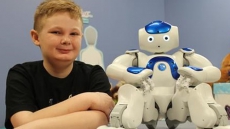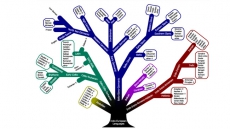Dr. Levente Orbán is a scientific expert on the cognitive processes and biological relevance of symmetry and spatial frequency to the Bombus impatiens.
But you can just call him the bumblebee guy.
“Bumblebees can see, smell, learn, remember and act on information, making them excellent models of fundamental psychological concepts,” said Orbán, who is a psychology instructor at Kwantlen Polytechnic University (KPU).
Orbán’s research mainly focuses on how bumblebees process visual information. With funding from KPU’s Office of Research and Scholarship and the Natural Sciences and Engineering Research Council of Canada (NSERC), Orbán collaborated with Dr. Deborah Henderson at the KPU Institute for Sustainable Horticulture, and the university’s Facilities and Information-Technology teams to open KPU’s unique Bee Cognition Lab at its Surrey campus last year.
The lab features a computer-monitored glass and mesh flight cage for 600 bumblebees. Cameras record where the bees land in different locations around the cage, and Levente and his students conduct research on the results.
Orbán estimates that only about a handful of other labs in the world are working with bees in the field of comparative psychology.
“Bees are small and simple, but they have very capable brains, which is what makes this type of research possible,” said Orbán.
Orbán is one of the guest speakers in the KPU-Science World Speaker Series. His talk, The Inspiration of Bees, will take place on Aug. 22 at 7 p.m. at Science World, 1455 Quebec St., Vancouver.
The other speakers are KPU horticulture instructor Jim Matteoni and KPU product design instructor Stephanie Phillips. Matteoni, who has researched the mating and breeding patterns of the Western bumblebee, is a specialist in biological pest controls in gardens and designs gardens to enhance natural predators of aphids. Phillips’ specialty is on the lifecycle of materials, with a focus on the development of new materials that are in sync with the natural world.
Admission to the KPU-Science World Speaker Series is free. RSVP and learn more at kpu.ca/scienceworld.
Orbán was born in Transylvania and at the age of seven moved to Hungary and lived in the small village of Nemesvámos, where he took full advantage of his natural surroundings by collecting and rearing the many small animals and birds that would make their way into his yard. These included frogs, pigeons and even a buzzard found struggling in a farmer’s field.
Orbán’s early experiences with nature fostered his love of all creatures great and small, and after moving to Vancouver at the age of 17, he eventually found himself studying psychology at KPU, where he completed his undergraduate honours thesis in 2008 with Dr. Farhad Dastur.
Dastur and the rest of the psychology department inspired him to continue his studies, and he earned a prestigious NSERC Alexander Graham Bell Canada Graduate Scholarship to complete his PhD in psychology at the University of Ottawa.
Orbán returned to KPU in 2014 to teach, bringing with him an enduring curiosity about the behaviour of bees. He also brought with him something unexpected: a bee allergy. Orbán was stung by bees three times while getting his PhD, with the last one landing him in a hospital emergency room.
Orbán was given five years of immunotherapy in which he was injected with bee venom once a week for a year, and then once every month to reduce his sensitivity. At KPU, Orbán’s bee lab is equipped with an Epipen and rigorous safety procedures as additional safeguards.
Orbán’s research is freely available on the Kwantlen Open Resource Access (KORA) website at kora.kpu.ca. KORA is a digital collection of hundreds of scholarly and creative works produced by KPU faculty and students.





